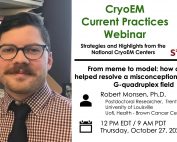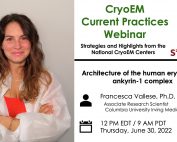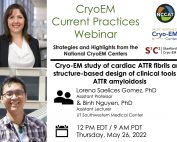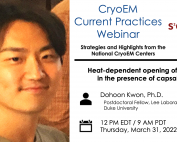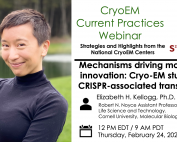CryoEM Current Practices Webinar 10/27/2022
The next installment of the monthly methods-focused webinar series hosted by the National Center for CryoEM Access and Training (NCCAT), the Pacific Northwest Center for CryoEM (PNCC), and the Stanford-SLAC CryoEM Center (S2C2) will be held on Thursday October 27, 2022 at 12 PM eastern / 9 AM pacific time Robert Monsen PhD, Postdoctoral Researcher, Trent Laboratory, University of Louisville Health, Brown Cancer Center will present: From meme to model: how cryo-EM helped resolve a misconception in the DNA G-quadruplex field Talk Abstract: Genomic regions with high guanine content have the capacity to fold into four-stranded non-B DNA structures known as G-quadruplexes (G4s). Extensive bioinformatic inquiries have revealed that G4 motifs are conserved and non-randomly distributed throughout the genome. G4s are [...]
CryoEM Current Practices Webinar 6/30/2022
The next installment of the monthly methods-focused webinar series hosted by the National Center for CryoEM Access and Training (NCCAT), the Pacific Northwest Center for CryoEM (PNCC), and the Stanford-SLAC CryoEM Center (S2C2) will be held on Thursday June 30, 2022 at 12 PM eastern / 9 AM pacific time Francesca Vallese, PhD, Associate Research Scientist, Columbia University Irving Medical Center will present: Architecture of the human erythrocyte ankyrin-1 complex Talk Abstract: The ankyrin-1 complex tethers the spectrin-actin cytoskeleton to the red blood cell (RBC) membrane, and acts as a metabolic hub, connecting membrane proteins that are involved in gas exchange, pH control, and regulation of cellular volume and deformability. Mutations in components of the complex lead to inherited defects in erythrocyte shape and [...]
CryoEM Current Practices Webinar 5/26/2022
The next installment of the monthly methods-focused webinar series hosted by the National Center for CryoEM Access and Training (NCCAT), the Pacific Northwest Center for CryoEM (PNCC), and the Stanford-SLAC CryoEM Center (S2C2) will be held on Thursday May 26, 2022 at 12 PM eastern / 9 AM pacific time Lorena Saelices Gomez, Assistant Professor & Binh Nguyen, Assistant Lecturer, Center for Alzheimer’s and Neurodegenerative Diseases, Department of Biophysics, UT Southwestern Medical Center will present: Cryo-EM study of cardiac ATTR fibrils and structure-based design of clinical tools for ATTR amyloidosis Talk Abstract: Cryo-electron microscopy (cryo-EM) has become the state-of-the-art technology to study the structures of helical assemblies like amyloid fibrils. The accumulation of these proteinaceous fibrils is associated with more than [...]
CryoEM Current Practices Webinar 3/31/2022
The next installment of the monthly methods-focused webinar series hosted by the National Center for CryoEM Access and Training (NCCAT), the Pacific Northwest Center for CryoEM (PNCC), and the Stanford-SLAC CryoEM Center (S2C2) will be held on Thursday March 31, 2022 at 12 PM eastern / 9 AM pacific time Dohoon Kwon, Ph.D., Post-Doctoral Scholar, Lee Laboratory, Duke University will present: Heat-dependent opening of TRPV1 in the presence of capsaicin Talk Abstract: Transient receptor potential vanilloid member 1 (TRPV1) is a Ca2+-permeable cation channel that serves as the primary heat and capsaicin sensor in humans. In published work, we determined the structures of apo and capsaicin-bound full-length rat TRPV1 reconstituted into lipid nanodiscs over a range of temperatures using cryo-EM. This [...]
CryoEM Current Practices Webinar 2/24/2022
The next installment of the monthly methods-focused webinar series hosted by the National Center for CryoEM Access and Training (NCCAT), the Pacific Northwest Center for CryoEM (PNCC), and the Stanford-SLAC CryoEM Center (S2C2) will be held on Thursday February 24, 2022 at 12 PM eastern / 9 AM pacific time Professor Elizabeth Kellogg, Robert N. Noyce Assistant Professor in Life Science and Technology. Cornell University, Molecular Biology and Genetics will present: Mechanisms driving molecular innovation: Cryo-EM studies of CRISPR-associated transposons Talk Abstract: CRISPR-associated transposition systems allow guide RNA-directed integration of a single DNA cargo in one orientation at a fixed distance from a programmable target sequence. In published work, we defined the mechanism explaining this process by characterizing the transposition regulator, TnsC, from [...]

